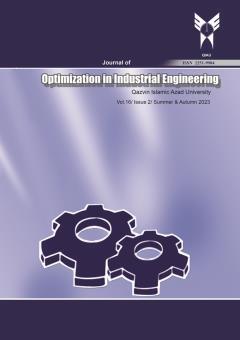Virtual alliance in hospital network for operating room scheduling: Benders decomposition
Subject Areas : SchedulingMahdis Lotfi 1 , Javad Behnamian 2 *
1 - Department of Industrial Engineering, Faculty of Engineering, Bu-Ali Sina University, Hamedan, Iran
2 - Department of Industrial Engineering, Faculty of Engineering, Bu-Ali Sina University, Hamedan, Iran
Keywords: Operating room scheduling, Distributed systems, Collaborative planning, Virtual alliance, Benders decomposition,
Abstract :
Abstract: This study deals with the scheduling of operating room networks of collaborative hospitals with the arrival of emergency patients. In this study, a set of independently owned hospitals form a virtual alliance network to increase resource utilization and reduce patient waiting time. Each hospital, in collaboration with other members, is primarily responsible for providing services to its patients and may have a different objective function, which has a priority over the overall objective function of the virtual distributed scheduling collaborative hospitals. So, the objective function of the problem is divided into two categories, but the overall objective function of the network is to reduce the cost of allocating patients to hospitals and surgeons, along with the cost of operating room overtime. In this study, to make the situation more realistic, the transshipment of the patient from one hospital to another is also taken into account. For this problem, a mixed-integer mathematical programming model is presented, and the Benders decomposition algorithm is designed. The efficiency of the algorithm was compared with experiments performed with the CPLEX solver, and finally, the results were reported. The results show that the proposed algorithm has good performance. Keywords: Operating room scheduling, Distributed systems, Collaborative planning, Virtual alliance, Benders decomposition
Adair, A. M. (1953). Planning and organizing an operating room suite. The American journal of nursing, 1212-1214.
Abdeljaouad, M. A., Bahroun, Z., Houda Saadani, N. E., & Zouari, B. (2020) A simulated annealing for a daily operating room scheduling problem under constraints of uncertainty and setup, INFOR: Information Systems and Operational Research, 58:3, 456-477.
Addis, B., Carello, G., Grosso, A., & Tànfani, E. (2016). Operating room scheduling and rescheduling: a rolling horizon approach. Flexible Services and Manufacturing Journal, 28(1-2), 206-232.
Arnaout, J.-P. M., & Kulbashian, S. (2008). Maximizing the utilization of operating rooms with stochastic times using simulation. Paper presented at the 2008 Winter Simulation Conference.
Behnamian, J. (2014). Decomposition based hybrid VNS–TS algorithm for distributed parallel factories scheduling with virtual corporation. Computers & Operations Research, 52, 181-191.
Behnamian, J. (2016). Agent-based approach for cooperative scheduling. Journal of Industrial and Systems Engineering, 9(4), 26-46.
Benders, J. F. (2005). Partitioning procedures for solving mixed-variables programming problems. Computational Management Science, 2(1), 3-19.
Benders, J. (1962). Partitioning procedures for solving mixed-variables programming problems '.
Ceschia, S., & Schaerf, A. (2016). Dynamic patient admission scheduling with operating room constraints, flexible horizons, and patient delays. Journal of Scheduling, 19(4), 377-389.
Chen, P-S., Hong, I-H., Hou, Y., Shao, Y-C., (2019). Healthcare scheduling policies in a sequence-number based appointment system for outpatients’ arrivals: Early, on time, or late?, Computers & Industrial Engineering, 130, 298-308.
Hamid, M., Hamid, M., Nasiri, M. M., & Ebrahimnia, M. (2018). Improvement of operating room performance using a multi-objective mathematical model and data envelopment analysis: A case study. International Journal of Industrial Engineering & Production Research, 29(2), 117-132.
Heydari, M., & Soudi, A. (2016). Predictive/reactive planning and scheduling of a surgical suite with emergency patient arrival. Journal of medical systems, 40(1), 30.
Jebali, A., Alouane, A. B. H., & Ladet, P. (2006). Operating rooms scheduling. International Journal of Production Economics, 99(1-2), 52-62.
Kamran, M. A., Karimi, B., & Dellaert, N. (2018). Uncertainty in advance scheduling problem in operating room planning. Computers & Industrial Engineering, 126, 252-268.
Noorizadegan, M., & Seifi, A. (2018). An efficient computational method for large scale surgery scheduling problems with chance constraints. Computational Optimization and Applications, 69, 535–561.
Pinedo, M. (2005). Planning and scheduling in manufacturing and services: Springer.
Rahimi, I., Hong Tang, S., Ahmadi, A., Binti Ahmad, S. A., Lee, L. S., & M Sharaf, A. (2017). Evaluating the effectiveness of integrated Benders decomposition algorithm and epsilon constraint method for multi-objective facility location problem under demand uncertainty. Iranian Journal of Management Studies, 10(3), 551-576.
Roshanaei, V., Luong, C., Aleman, D. M., & Urbach, D. (2017a). Propagating logic-based Benders' decomposition approaches for distributed operating room scheduling. European Journal of Operational Research, 257(2), 439-455.
Roshanaei, V., Luong, C., Aleman, D. M., & Urbach, D. R. (2017b). Collaborative operating room planning and scheduling. Informs journal on computing, 29(3), 558-580.
Roshanaei, V., Luong, C., Aleman, D. M., & Urbach, D. R. (2020). Reformulation, linearization, and decomposition techniques for balanced distributed operating room scheduling. Omega, 93, 102043.
Tyler, D. C., Pasquariello, C. A., & Chen, C.-H. (2003). Determining optimum operating room utilization. Anesthesia & Analgesia, 96(4), 1114-1121.
van Essen, J. T., Hans, E. W., Hurink, J. L., & Oversberg, A. (2012). Minimizing the waiting time for emergency surgery. Operations Research for Healthcare, 1(2-3), 34-44.
Wang, S., Roshanaei, V., Aleman, D., & Urbach, D. (2016). A discrete event simulation evaluation of distributed operating room scheduling. IIE Transactions on Healthcare Systems Engineering, 6(4), 236-245.
Zonderland, M. E., Boucherie, R. J., Litvak, N., & Vleggeert-Lankamp, C. L. (2010). Planning and scheduling of semi-urgent surgeries. Healthcare Management Science, 13(3), 256-267.

